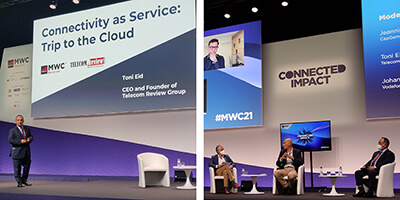Fueled by an intensely competitive operating environment in Indonesia’s mobile sector, Indosat Ooredoo partnered with Comviva in delivering a front-to-end real-time marketing management platform, as well as subscribers’ loyalty and rewards program to yield increased customer retention and revenue within months from implementation.
Featured Articles
Atrebo: “We are moving forward and faster into the automation”
ExpiredDuring the Mobile World Congress (MWC) 2021, Luis del Valle Alemán, chief revenue officer at Atrebo, a leading solution provider for the digital transformation of infrastructure and asset management, spoke to Telecom Review in an exclusive interview.
Transiting to open RAN for next-generation operator networks
ExpiredIn the 5G era, networks must be flexible, scalable and agile. To support the evolving needs of digitalized economies, the industry is undergoing an overhaul, slowly transiting from legacy radio access networks (RAN) to open RAN as network operators aim to expedite cost-effective 5G network rollouts to expand networks and meet the surge in demand for connectivity to power future-ready networks.
Zoran Vasiljev: Centili is raising the bar as a digital monetization company
ExpiredCentili, a global digital monetisation company, is at the MWC 2021 in Barcelona showcasing and discussing the latest trends in digital monetization platform-as-a-service, an area the company has been focusing on for several years.
Hyperconnectivity: The essential building block of a smart city
ExpiredBy Idris Vasi, head of sales, Nokia Cloud and Network Services, Asia-Pacific & Japan
We are now living in an age of increasing technological innovation. You could even say that we are experiencing a technological renaissance as more people and businesses are adopting advanced technologies at unprecedented rates. However, they are also doing it faster than many cities – especially those within Asia-Pacific.
Connectivity as a service: Trip to the cloud
ExpiredToni Eid, the CEO and founder of Telecom Review Group, graced the stage as one of the speakers of the physical-only session that highlighted the switch to a cloud native approach in terms of connectivity.
ZTE’s Zhang Dayong: Delivering data center efficiently to help build a digital economy
ExpiredFrom June 17 to 19, 2021, CDCC (China Data Center Working Group) and DCRE (Green Energy Technology Alliance for the Data Center) jointly hosted the 2021 China Data Center Green Energy Conference which solemnly opened in the new Shanghai International Expo Center. Under the themed "Innovative, energy-efficient, and low-carbon future," ZTE proposed its efficient Data Center Delivery Solution, demonstrating the end-to-end delivery capability covering the full life cycle.
The future of direct carrier billing and carrier-OTT partnerships
ExpiredIncreased smartphone penetration and a rise in demand for over-the-top (OTT) content have driven the growth of the global direct carrier billing (DCB) market. Valued at US$29.8 billion in 2019, the global DCB market is estimated to reach US$70 billion by 2025, fuelled by a surge in video and audio streaming, as well as consumers’ preference for seamless, secure, and accessible payment modes.
Enhancing cybersecurity: Protecting people, data and services
ExpiredRemote working has made cyber threats more prevalent globally. Now more than ever, cybersecurity must be at the forefront of business processes. Telecom Review Asia interviews Bernadette Wightman, managing director, banking and financial services, BT, to find out more about cybersecurity challenges that stem from hybrid working and best practices to adopt as organisations tackle evolving risks.
The rise of location-based advertising in a digitalized world
ExpiredWith the rise of IoT and connected devices as companies innovate to drive profitable growth, location data is becoming an increasingly important asset across myriad industries such as retail and logistics, where consumers are reached out to based on location data to create enhanced customer experiences.














